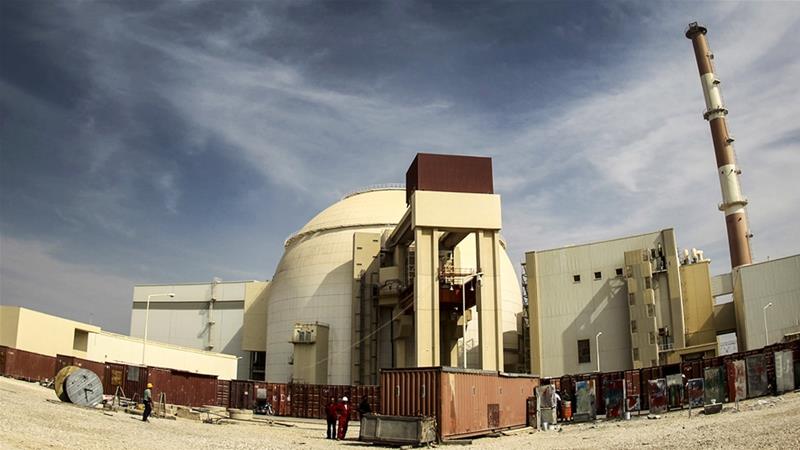Iran lifts more limits on nuclear programme as deal unravels
Tehran announces the go-ahead of ‘whatever is needed’ to jump-start nuclear programme as 2015 deal fades away.
Iran is poised to begin work on advanced centrifuges that will enrich uranium faster as the 2015 nuclear deal unravels further after European nations failed to step up and counter devastating US sanctions.
Iranian President Hassan Rouhani ordered the removal of all limits on nuclear research and development – the third major step to scale down commitments to the 2015 nuclear accord with world powers.
“I, as of now, announce the third step,” Rouhani said on state television late on Wednesday, just as the United States announced that it was imposing sanctions against an oil-shipping network with ties to Iran’s Islamic Revolutionary Guard Corps (IRGC).
“The atomic energy organisation [of Iran] is ordered to immediately start whatever is needed in the field of research and development, and abandon all the commitments that were in place regarding research and development.”
The nuclear deal – agreed on by Iran, China, France, Germany, Russia, the United Kingdom, the US and the European Union – gave Tehran sanctions relief in exchange for accepting curbs on its nuclear programme.
Since the US unilaterally withdrew from the deal in May 2018 and reimposed sanctions in a “maximum pressure” campaign on Iran, Tehran has insisted it wants to save the pact but that the remaining signatories – especially Europe – must provide additional economic support.
Scaling back commitments
The announcement came hours after Rouhani threatened to take the step if Europe failed to provide a solution by Friday to allow Iran to sell its oil abroad after the US’s withdrawal and sanctions.
“Iran’s third step is of an extraordinarily significant nature,” Rouhani said earlier during the day, without detailing what that would entail.
In July, Iran reduced two other nuclear commitments: to keep its stockpile of enriched uranium below 300kg and a 3.67 percent cap on the purity of its uranium stocks.
Al Jazeera’s Dorsa Jabbari, reporting from Tehran, said the latest move meant that Iran was serious about not staying in the deal by themselves.
“The Iranians are reducing their commitments to try and force Europeans to come to some kind of an agreement to move forward and see the economic benefits they have been promised,” she added.
A short time after Rouhani’s statement, US officials announced new sanctions on Iran, this time aimed at a shipping network it said was run by Iran’s Revolutionary Guard Corps to allegedly smuggle oil.
The US also offered a reward of up to $15m for anyone with information that could disrupt the financing of the guards, signalling that it was not letting up pressure on Tehran.
Europe reacts
The EU on Thursday urged Iran to reverse its scale-back of commitments to the nuclear accord.
European Commission spokesman Carlos Martin Ruiz de Gordejuela told a media briefing in Brussels the decision was “inconsistent” with the agreement.
“And in this context, we urge Iran to reverse these steps and refrain from further measures that undermine the nuclear deal,” he said.
France’s foreign ministry on Thursday called on Iran to refrain from any activities that did not comply with its 2015 nuclear deal obligations.
“Iran must refrain from any concrete action that is not in line with its commitments and that may hinder de-escalation efforts,” foreign ministry spokeswoman Agnes von der Muhll told reporters.
She added Paris would study the Iranian announcement with its partners and the UN atomic agency.
The United Kingdom said it was concerned and disappointed by Iran’s plan to take another step away from the landmark nuclear deal by starting to develop centrifuges to speed up uranium enrichment.
“Iran’s plan to suspend limits on nuclear research and development is deeply concerning,” the Foreign Office said in a statement.
“This third step away from its commitments under the nuclear deal is particularly disappointing at a time when we and our European and international partners are working hard to de-escalate tensions with Iran.”
Diplomatic efforts
US sanctions imposed after US President Donald Trump withdrew from the deal have curbed Iran’s oil exports and sent its economy into freefall, while what is left of the accord steadily unravels.
At the same time, tensions have spiked across the Gulf over mysterious tanker explosions, the shooting down of a US military surveillance drone by Iran and the US deploying more troops and fighter jets to the region.
The International Atomic Energy Agency confirmed last week that Iran’s stockpile of low-enriched uranium exceeded the amount allowed by the deal.
The UN agency also said Iran continued to enrich uranium up to 4.5 percent, above the 3.67 percent allowed under the agreement but still far below weapons-grade levels of 90 percent.
French President Emmanuel Macron is leading talks seeking relief for Iran and a de-escalation of tensions. This week, Iran’s Foreign Minister Mohammad Javad Zarif travelled to Moscow while Araghchi went to Paris and elsewhere in Europe to press for a solution.
Inside Story
Can Europe save the Iran nuclear deal?
Source: Read Full Article



